The Project Team consists of faculty members, postdoctoral and graduate students drawn from a variety of disciplines in the fine arts, social sciences, and humanities. A full-time administrative assistant oversees the project, and technical assistance is provided by support staff from the Department of Film at York University.
Director
Janine Marchessault, Director
CV Website
 Dr. Marchessault is Professor of Cinema and Media Studies in the Department of Cinema and Media Arts at York University, where she held the Canada Research Chair in Art, Digital Media and Globalization (2003-2013). She was the co-founder of Future Cinema Lab and the inaugural Director of Sensorium: Centre for Digital Arts and Technology Research at York University. In 2012, Professor Marchessault was awarded a prestigious Trudeau Fellowship to pursue her ground breaking curatorial and public art research around the problem of sustainable development. She has (co)curated numerous large-scale public art exhibitions in Toronto and beyond—Being on Time (2001), The Leona Drive Project (2009), Museum for the End of the World (2012) and Land|Slide, Possible Futures (2013) which are all site specific exhibitions. Land|Slide was named one of the best exhibitions in Canada in 2013 by Canadian Art Magazine, and was invited to be part of the Shenzhen/Hong-Kong Architectural Biennale (2013-2014).
Dr. Marchessault is Professor of Cinema and Media Studies in the Department of Cinema and Media Arts at York University, where she held the Canada Research Chair in Art, Digital Media and Globalization (2003-2013). She was the co-founder of Future Cinema Lab and the inaugural Director of Sensorium: Centre for Digital Arts and Technology Research at York University. In 2012, Professor Marchessault was awarded a prestigious Trudeau Fellowship to pursue her ground breaking curatorial and public art research around the problem of sustainable development. She has (co)curated numerous large-scale public art exhibitions in Toronto and beyond—Being on Time (2001), The Leona Drive Project (2009), Museum for the End of the World (2012) and Land|Slide, Possible Futures (2013) which are all site specific exhibitions. Land|Slide was named one of the best exhibitions in Canada in 2013 by Canadian Art Magazine, and was invited to be part of the Shenzhen/Hong-Kong Architectural Biennale (2013-2014).
For over the past five years she has also worked with researchers and curators to uncover some of missing film experiments pioneered at Expo 67. Her latest co-edited anthology (with M. K. Gagnon) Reimagining Cinema: Film at Expo 67 (McGill-Queen’s Press, Fall 2014) documents these multiscreen events. She is also involved in on-going archival research related to Edmund Carpenter and Marshall Mcluhan’s media think-tank and journal Explorations in the early 1950s at the University of Toronto under the rubric of the Explorations Seminar. The anthology Cartographies of Place: Navigating the Urban (with M. Darroch, McGill-Queen’s 2014) examines new models of the media city. Marchessault is the author of ten monographs and (co)edited volumes, and over fifty articles in books, journals and catalogues devoted to cinema, new media, and contemporary art. She is a past President of the Film Studies Association of Canada and a co-founder of the Future Cinema Lab devoted to creating ‘new stories for new screens’. She has lectured widely, and held faculty positions at McGill University and Ryerson University. Monographs in preparation: Ecstatic Worlds: Media, Utopias, Ecology (forthcoming MIT Press); and Archival Imaginary: Creative Approaches to Digital Memory. Collections in preparation include The Oxford Handbook to Canadian Cinema (with Will Straw, Oxford) and Process Cinema: HandMade Film in the Digital Age (with S. MacKenzie McGill-Queen’s). Exhibition in preparation includes a site specific engagement with revitalization in Toronto’s Lawrence Heights, Houses on Pengarth (2016-2019).
Michael Darroch, Co-Investigator
Michael Darroch is Assistant Professor in the Department of Communication Studies, University of Windsor, and a Co-Investigator on the Visible City Project + Archive (www.visiblecity.ca). He received his PhD from McGill University’s Department of Art History & Communication Studies. He holds an MA in German Studies from Université de Montréal, and has also attended graduate studies at Universität Konstanz and Humboldt-Universität zu Berlin. Recent publications include "Bridging Urban and Media Studies: Jaqueline Tyrwhitt and the Explorations Group 1951-1957" (Canadian Journal of Communication 2008), "Digital Multivocality and Embodied Language in Theatrical Space" (Intermédialités 12, 2008) and "'The Dragonfly of Chicoutimi': Staging Polyphony in Montréal and Toronto" in Urban Enigmas: Montréal, Toronto and the Problem of Comparing Cities (McGill-Queen’s 2007). He has also translated for several production companies and playwrights.
Sharon Hayashi, Co-Investigator
BA (Brown), MA, PhD (Chicago)
Assistant Professor: Film Studies
Department of Film, York University
Professor Hayashi specializes in Japanese cinema and media studies. Her research focuses on the intersection of visual culture and history. Current research projects includes a study of Japanese cinema and empire, a critical history of Japanese Pink Cinema, and a web-based archival documentary about the uses of new media by new social movements. She has worked in documentary film and TV production and as a programmer and translator for Japanese and Asian film festivals.
Dr. Hayashi's teaching and research areas include: film history, historiography and criticism; critical theory, gender and media; colonial and diasporic cinemas; travelling and regional cinemas, postcolonial film; transnationalism; globalization; and East Asian film and video.
Selected publications include: "Negotiating Mobile Subjectivities: Costume Play, Landscape and Belonging in the Colonial Road Movies of Shimizu Hiroshi", Film,History and Cultural Citizenship, ed. Tina Chen, Routledge (forthcoming); "Goodbye Kitty, Hello War: The Tactics of Spectacle and New Youth Movements in Urban Japan”, with Anne Mcknight. Positions: East Asia Cultures Critique, vol.13 no.1, Spring 2005; and "Women on the Run: Travel and Utopia in the Films of Shimizu Hiroshi", Hong Kong International Film Festival Catalogue, April 2004.
Susan Lord, Co-Investigator
Susan Lord is Associate Professor in Film Studies and holds cross-appointments with the Departments of Art and Women’s Studies at Queen's University in Kingston, Ontario. She serves as an Adjunct Professor for Carleton University’s SSAC/Film program. Her main teaching and research areas are feminist theory and film culture, cultural studies of media and technology, and Cuban film and visual culture. She has published on gender and technology, as well as on feminist film culture in several recent anthologies. She edited a special section of West Coast Line on “Global Screens,” and co-edited two collections of essays: with Janine Marchessault, Fluid Screens, Expanded Cinema (University of Toronto Press, 2007); and with Annette Burfoot, Killing Women: The Visual Culture of Gender and Violence (Wilfrid Laurier University Press, 2006). She is midway through a manuscript on the Cuban filmmaker Sara Gómez. She is a member of the Public Access Collective and has edited several issues of Public, including the recent "Digipopo: Digital Poetics and Politics."
Scott MacKenzie, Co-Investigator
BA, MA, PhD (McGill)
Scott MacKenzie concentrates on the areas of moving images and the public sphere, transnationalism and globalization, post-Situationist questions of space and inter-mediality, and cultural theory and cultural history.
Selected publications include: the monographs Screening Québec: Québécois Moving Images, National Identity and the Public Sphere (Manchester University Press, 2004); Guy Debord (French Filmmakers Series, Manchester University Press, forthcoming); the anthologies Cinema and Nation (with Mette Hjort, Routledge, 2000); Purity and Provocation: Dogme ’95 (with Mette Hjort, BFI, 2003); and The Perils of Pedagogy: The Works of John Greyson (with Brenda Longfellow and Thomas Waugh, McGill-Queens University Press, forthcoming), and numerous articles and chapters on video activism, experimental media, political cinemas, Québécois image-making practices, critical theory, and moving images and transnationalism. He had taught widely in the UK and Canada.
Tess Takahashi, Co-Investigator
BA (Brown), MA (NYU), PhD (Brown)
Assistant Professor: Film Studies
Department of Film, York University
Professor Takahashi specializes in experimental media and technology. Her research focuses on the historical and discursive construction of technologies of the image including photography, celluloid film, television, video, animation, and digital media.
Dr. Takahashi's teaching and research interests include: theories of technology, theories of the subject, community and collectivism, transnationalism, postcolonial theory, globalization, international avant-garde cinemas, third cinema, and experimental documentary. She is currently working on a book based on her prize-winning dissertation, Impure Film: Medium Specificity and the North American Avant-Garde (1965-2005).
Selected publications include: "The Imaginary Archive," Camera Obscura; "Writing the World: Medium Specificity and Avant-Garde Film in the Digital Age," Visible Language; "'Meticulously, Recklessly Worked-Upon': Materiality in Contemporary Experimental Animation," The Sharpest Point: Animation at the End of Cinema; and “Conversations with Julia Meltzer and David Thorne on Experimental Documentary;” Millennium Film Journal.
Research Associates
Nicholas Balaisis
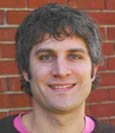 Nicholas Balaisis is a doctoral candidate in the Joint Programme in Communication and Culture at York University, now in his third year of study. He has worked as a graduate researcher at the Visible City project since 2004.
Nicholas Balaisis is a doctoral candidate in the Joint Programme in Communication and Culture at York University, now in his third year of study. He has worked as a graduate researcher at the Visible City project since 2004.
Nicholas' primary area of research is the role of film in the public sphere, with a particular focus on film spectatorship and citizen building. His previous research has examined the writing of Italian film theorist Cesare Zavattini and the role of cinema in the reconstruction of post-war Italian civil society. He has also recently examined the phenomenological aspects of Iranian director Abbas Kiarostami, arguing that his particular use of the car in many of his films opens up new ways for considering both visual perception and public space in modern day Iran. His dissertation explores the role of mobile cinema ('Cine-Movil') in post-revolutionary Cuba, focusing on the ways that the state initiated film campaign and its itinerant exhibition sites contributed to the formation of a modern, alternative public sphere.
Nicholas is currently a teaching assistant in the department of film at York and has recently instructed a course in the department, European Cinema to 1960.
Anna Friz
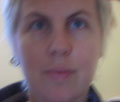 B.A. Women's Studies (UBC), M.A. Media Studies (Concordia)
B.A. Women's Studies (UBC), M.A. Media Studies (Concordia)
Anna Friz is a sound/radio artist, and currently a doctoral candidate in the Joint Programme in Communication and Culture at York University. She is a SSHRC Doctoral Fellow, and holds a Susan Mann Dissertation Scholarship from York University (2009-2010). Anna's research interests include critical radio art and practice, the future as imagined by the past, and experimental sound and noise. Her doctoral dissertation focuses on critical theories of technology and affect as related to radio, particularly through the practise of radio art. She also works extensively with field(s) recordings of urban spaces, both acoustic and Hertzian. Anna has contributed chapters to anthologies such as Islands of Resistance: Pirate Radio in Canada (2009), Re-inventing Radio (2008), Site of Sound: Architecture/Music/Acoustics (2007), Relating Radio: Communities, Aesthetics, Access (2006), Acoustic Space Reader (2003, 2008); and published articles on sound art and critical media studies in PAJ: A Journal of Performance Art, Cinema Journal, Wi: Journal of Mobile Media, Public, Musicworks, .dpi, G.E.M.S. (Gender, Education, Music and Society), and various exhibition catalogues.
Since 1998 Friz has predominantly created self-reflexive radio works for international broadcast, installation or performance, where radio is the source, subject, and medium of the work. She creates performances and installations utilizing up multiple FM transmitters and a multitude of radio receivers, and as well as designing sound for theatre, dance, and mobile tours. Anna has performed and exhibited widely across Canada, and at international venues and festivals such as Third Coast Audio Festival (Chicago, IL), PS 122 (New York, NY), AS220 (Providence, RI), the Fifth International Biennial of Radio (Mexico City), Arte Nuevo Interactiva (Yucatan), Sonorities Festival of Contemporary Music (Belfast, IE), Club Transmediale/ Bootlab (Berlin, DE), Die Akademie der Künste (Berlin, DE), Art+Communication (Riga, LV), Von Krahl (Tallinn, EE), Ars Electronica (Linz, AT), Digitales (Brussels, BE), Radiophonic 07 (Brussels, BE), Observatori (Valencia, ES), RadiaLX (Lisbon, PT). Her work has been funded by the Canada Council for the Arts, the Conseil des arts et des lettres du Québec, the Québec Delegation in Mexico, and the SOCAN Foundation. Her radio art/works have been commissioned by national public radio in Canada, Austria, Germany, Denmark, Spain, and Mexico, and heard on independent airwaves in more than 15 countries. Friz has lectured and performed at numerous universities and art institutes in Canada, as well as CCRMA at Stanford University, the Estonian Academy of Arts in Tallinn, Estonia, and UNAM, Mexico City, Mexico. Anna is a wavefarm.org transmission artist.
Eli Horwatt
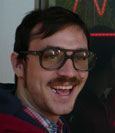 Eli Horwatt is a Graduate Assistant to Janine Marchessault. He has been editing archival materials and writing biographies for Visible City since Fall 2007. Eli is currently a Masters student in Cinema Studies researching found-footage and its development on internet video forums like Youtube, in the form of mashups, recuts and machinima. Eli has worked for several years in preproduction in Los Angeles and Toronto and has worked for nearly ten years in film archives. Some of his research can be found on his blog recycledcinema.blogspot.com. He studied modernist literature for his undergraduate degree at University of California at Riverside.
Eli Horwatt is a Graduate Assistant to Janine Marchessault. He has been editing archival materials and writing biographies for Visible City since Fall 2007. Eli is currently a Masters student in Cinema Studies researching found-footage and its development on internet video forums like Youtube, in the form of mashups, recuts and machinima. Eli has worked for several years in preproduction in Los Angeles and Toronto and has worked for nearly ten years in film archives. Some of his research can be found on his blog recycledcinema.blogspot.com. He studied modernist literature for his undergraduate degree at University of California at Riverside.Angela Joosse
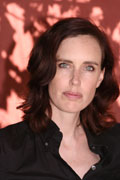 Angela Joosse is a doctoral student in the Joint Program in Communication and Culture at York and Ryerson Universities. Since the fall of 2006 she has contributed to the Visible Cities Project as a graduate researcher and artist. While developing a strong working synthesis of theory and praxis, Angela completed an MA in Communication and Culture, BFA in Film Studies, and BA in Philosophy and Art. Her current doctoral project focuses on the intersection of aesthetics, technology and the human body. Her academic awards include Master’s and Doctoral Canada Graduate Scholarships, an Ontario Graduate Scholarship, and the Edward S. Rogers Sr. Graduate Fellowship.
Angela Joosse is a doctoral student in the Joint Program in Communication and Culture at York and Ryerson Universities. Since the fall of 2006 she has contributed to the Visible Cities Project as a graduate researcher and artist. While developing a strong working synthesis of theory and praxis, Angela completed an MA in Communication and Culture, BFA in Film Studies, and BA in Philosophy and Art. Her current doctoral project focuses on the intersection of aesthetics, technology and the human body. Her academic awards include Master’s and Doctoral Canada Graduate Scholarships, an Ontario Graduate Scholarship, and the Edward S. Rogers Sr. Graduate Fellowship.
Angela has contributed research as well as a comprehensive bibliography and filmography to the recent publication, Image and Territory: New Essays on Atom Egoyan (2007), edited by Monique Tschofen and Jennifer Burwell. Angela is author of Dziga Vertov and Steve Mann: The Embodiment of the Master Metaphor Of Vision (Intersections Journal, 2005). She is also a Toronto-based film and video artist. Her recent projects include Shapes Eat Shapes (2006), 4C (2005) and Avra which screened at the 2004 Montréal Festival des Films du Monde. She is currently working on two collaborative art installation projects: a special fifth anniversary project for the 2007 Alley Jaunt festival; and “Film-Lab-Digestive-Track,” an interactive installation to be held at the Ryerson Gallery (August 2007). She is an active member of the L.O.T. creative urban research group, as well as the LOOP collective of independent media artists in Toronto.
Aleksandra Kaminska
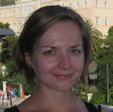 Aleksandra Kaminska entered the joint PhD program in Communication and Culture at York and Ryerson Universities in 2006 after completing her MA in Media Ecology at New York University. Her research interests include material approaches and cultural histories of technologies, theories of communication, media arts, digital aesthetics, and the artistic practices which create communities. She is currently interested in how media technologies help artists in Communist or post-Communist regimes reimagine new forms of democratic citizenship and create a new politics of media and art while provoking a reorganization of traditional literary and visual forms. Her case studies are focused on Poland and China.
Aleksandra Kaminska entered the joint PhD program in Communication and Culture at York and Ryerson Universities in 2006 after completing her MA in Media Ecology at New York University. Her research interests include material approaches and cultural histories of technologies, theories of communication, media arts, digital aesthetics, and the artistic practices which create communities. She is currently interested in how media technologies help artists in Communist or post-Communist regimes reimagine new forms of democratic citizenship and create a new politics of media and art while provoking a reorganization of traditional literary and visual forms. Her case studies are focused on Poland and China.
Publications include “Locating the Ephemeral: Capturing the Fleeting Moment in Digital Arts” in the International Journal of Arts and TechnologyPUBLIC (2008). As a member of L.O.T. 1 she presented a special fifth anniversary video sculpture installation for the Alley Jaunt event in Toronto called Collect My Junk (2007). She is a teaching assistant in the Communications Studies department at York, a researcher for the Visible City Project + Archive and co-editor of PUBLIC’s 20th Anniversary Issue, “Public?” (2008).
Ya-Yin Ko
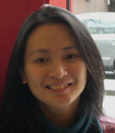 Ya-Yin Ko has been a manager and researcher for the Visible City Project since 2005. She oversees archiving, event organization, and website content production. She has a Diploma in Media Arts from Sheridan College, a BA in Film Studies from York University, and an MA in Communication and Culture from York and Ryerson Universities.
Ya-Yin Ko has been a manager and researcher for the Visible City Project since 2005. She oversees archiving, event organization, and website content production. She has a Diploma in Media Arts from Sheridan College, a BA in Film Studies from York University, and an MA in Communication and Culture from York and Ryerson Universities.Bruno Lessard, Postdoctoral Fellow
He has published widely on topics as diverse as intermedia adaptation, film installation, net art, contemporary opera, digital cinema, film music, and modern cinema. His articles have appeared in interdisciplinary journals such as Intermédialités and Parachute, and he has forthcoming essays in the following book collections: The Continuum Companion to Sound in Film and the Visual Media (Continuum), In the Dark Room of Marguerite Duras (Peter Lang), Macbeth: New Critical Essays (Routledge), and Save as ∑ Digital Memories (Palgrave Macmillan).
In his spare time, Bruno is an amateur digital filmmaker who also has an interest in film installation design.
Saara Liinamaa
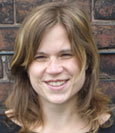 Saara Liinamaa is an arts writer and researcher currently finishing her doctoral dissertation in Social and Political Thought, York University. Her research addresses issues in modern and contemporary art, culture and the city. She is currently working on topics such as art’s urban “playgrounds” and the role of the contemporary artist as urban researcher. Saara is a member of the Public Access Collective, and has contributed to and co-edited two urban-themed issues of Public, “Localities” (29) and “Urban Interventions” (32). She has carried out interviews in Toronto, Helsinki and Havana for the Visible City Project.
Saara Liinamaa is an arts writer and researcher currently finishing her doctoral dissertation in Social and Political Thought, York University. Her research addresses issues in modern and contemporary art, culture and the city. She is currently working on topics such as art’s urban “playgrounds” and the role of the contemporary artist as urban researcher. Saara is a member of the Public Access Collective, and has contributed to and co-edited two urban-themed issues of Public, “Localities” (29) and “Urban Interventions” (32). She has carried out interviews in Toronto, Helsinki and Havana for the Visible City Project.Steven Logan
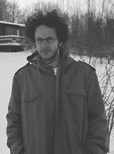 Steven Logan entered the Joint Progamme in Communication and Culture at York University in 2007, after spending four years in the Czech Republic as the co-editor of Carbusters magazine. He joined the Visible City Project as a member of L.O.T.: Experiments in Urban Research in the Spring of 2008, and is currently researching the history of Willowdale in the archives of the North York Public Library. This research reflects his ongoing fascination with his own upbringing in the suburb of Willowdale and with the automobile and the particular way it insinuates itself in the landscape. He is particularly interested in restoring the conceptual links between transportation and communication.
Steven Logan entered the Joint Progamme in Communication and Culture at York University in 2007, after spending four years in the Czech Republic as the co-editor of Carbusters magazine. He joined the Visible City Project as a member of L.O.T.: Experiments in Urban Research in the Spring of 2008, and is currently researching the history of Willowdale in the archives of the North York Public Library. This research reflects his ongoing fascination with his own upbringing in the suburb of Willowdale and with the automobile and the particular way it insinuates itself in the landscape. He is particularly interested in restoring the conceptual links between transportation and communication.
His publications include Krotitelé aut: hrdinové nového století – an anthology of articles from Carbusters, translated and published in Czech – for which he was editor, and “Everyone in Leather: Work and Play in the Consumer Culture of The Gap” (Critical Sense: a Journal of Political and Cultural Theory 2002).
Shana MacDonald
Ms. MacDonald is an internationally screened experimental filmmaker whose recently completed trilogy has been shown throughout Canada, France, the Czech Repbulic, Colombia, Venezuela, and Argentina. She is a member of the Loop Collective, an artist run group committed to the production and exhibition of avant-garde cinema. She has curated film programs for Bishops University and York University and for the Alucine Latin American film festival. Through the invitation of many academic and filmic institutions she has had the opportunity to lecture on experimental and Latin American cinema as well as on her own films and creative process. She has been a part of many artistic and academic panels at conferences in Cuba, Canada and the United States. Ms. MacDonald has been a Teaching Assistant for the Film Department at York University for the last three years. Her present creative endeavors include the start of a new film cycle on city spaces, as well as a film series on the Canadian landscape. She is also beginning a collaboration with several other Canadian filmmakers and choreographers on a performance piece to be shown in the Spring of 2008.
Aimée Mitchell
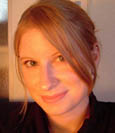 Aimée Mitchell is a doctoral candidate in the York-Ryerson Graduate Program in Communication and Culture. Her current research involves Canadian amateur cinema, cultural historiography and film preservation. She has been involved with the Canadian Filmmakers Distribution Centre’s Preservation Committee since 2007, and acted as the Centre’s in-house film archivist in the summer of 2008. She wrote an MA thesis at York on the work of filmmaker Chris Marker, which examined the migratory nature of the modern-day traveler. Aimée is also currently involved in a collaborative project between Concordia and York University that is researching the multi-screen films of Canada's Expo '67. She has been the Special Projects Coordinator for the Visible City Project + Archive (http://www.visiblecityproject.ca) since 2005. Her research interests span from home-movie travel films, found footage and experimental documentaries, to memory and its relationship to public space.
Aimée Mitchell is a doctoral candidate in the York-Ryerson Graduate Program in Communication and Culture. Her current research involves Canadian amateur cinema, cultural historiography and film preservation. She has been involved with the Canadian Filmmakers Distribution Centre’s Preservation Committee since 2007, and acted as the Centre’s in-house film archivist in the summer of 2008. She wrote an MA thesis at York on the work of filmmaker Chris Marker, which examined the migratory nature of the modern-day traveler. Aimée is also currently involved in a collaborative project between Concordia and York University that is researching the multi-screen films of Canada's Expo '67. She has been the Special Projects Coordinator for the Visible City Project + Archive (http://www.visiblecityproject.ca) since 2005. Her research interests span from home-movie travel films, found footage and experimental documentaries, to memory and its relationship to public space.Julie Nagam
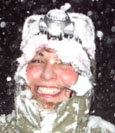 Julie Nagam is a PhD Student in Social and Political Thought at York University and began working as a Research Associate for the Visible City Project + Archive in May 2007. The proposed research will use oral histories and archeological artifacts to create a consciousness that entails constructing a critical cartography of the land, and at the same time raises questions of colonialism, capitalism, ownership, geography and community. The aim of this research is to examine the complications that Indigenous perspectives bring to an understanding of how urban spaces are constructed and to weave together these embedded layers through the use of post-colonial theory.
Julie Nagam is a PhD Student in Social and Political Thought at York University and began working as a Research Associate for the Visible City Project + Archive in May 2007. The proposed research will use oral histories and archeological artifacts to create a consciousness that entails constructing a critical cartography of the land, and at the same time raises questions of colonialism, capitalism, ownership, geography and community. The aim of this research is to examine the complications that Indigenous perspectives bring to an understanding of how urban spaces are constructed and to weave together these embedded layers through the use of post-colonial theory.
Julie completed a Master of Arts in Native Studies and a four year Bachelor of Arts Advanced with a major in Women’s Studies and minors in Native Studies and Art History at the University of Manitoba. She also participated in an exchange program with full scholarship at the University of Iceland and Iceland Academy of the Arts. Julie has conducted research on Inuit artists in Pangnirtung, Nunavut; on rural and northern women artists in Manitoba for Mentoring Artists for Women’s Art; on women’s issues for the YWCA of Thompson; on equity employment for Thompson Multi Cultural Center and women’s issues for the Icelandic Center for Feminist Research. Recently she was a board member of Thompson Arts Council, Thompson Crisis Center and a member of Manitoba Arts Council Arts Advisory Panel. Currently she is a collective member of Canadian Dimension, 2004, and LOT, 2007. Her art practices include mentorship in Pangnirtung, Nunavut and Bali, Indonesia, collective performances in Belo Horizonte, Brazil, individual installations in Reykjavik, Iceland and Winnipeg, Manitoba.
Eva Nesselroth-Woyzbun
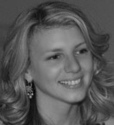 Eva Nesselroth-Woyzbun is a third year doctoral student in the York-Ryesron Joint Graduate Programme in Communication and Culture. Her primary research concerns the material aspects of digital communication tools. Her research explores ways in which we can apply Marshall McLuhan’s aphorism, the medium is the message to digital technologies. In particular, how do the material aspects of digital tools impact the ways in which we create, transfer, and receive information over digital media? Her research also includes a study of the philosophical works of Walter Benjamin, Bruno Latour, and the early communications scholars, Harold Innis and Walter Ong. From these legacies we can trace the insights of those who were concerned with the relationship between a society’s use of materials and deeper epistemological values. She holds an MA from York University in Communication and Culture, and an Hon. BA in Semiotics and Communication from the University of Toronto. She is also an avid gamer, amateur mycologist, low-brow art connoisseur, and an incorrigible varlet.
Eva Nesselroth-Woyzbun is a third year doctoral student in the York-Ryesron Joint Graduate Programme in Communication and Culture. Her primary research concerns the material aspects of digital communication tools. Her research explores ways in which we can apply Marshall McLuhan’s aphorism, the medium is the message to digital technologies. In particular, how do the material aspects of digital tools impact the ways in which we create, transfer, and receive information over digital media? Her research also includes a study of the philosophical works of Walter Benjamin, Bruno Latour, and the early communications scholars, Harold Innis and Walter Ong. From these legacies we can trace the insights of those who were concerned with the relationship between a society’s use of materials and deeper epistemological values. She holds an MA from York University in Communication and Culture, and an Hon. BA in Semiotics and Communication from the University of Toronto. She is also an avid gamer, amateur mycologist, low-brow art connoisseur, and an incorrigible varlet.
Eva is a partner on the LOT 3 project which includes an exploration of Toronto’s Baby Point neighbourhood and its mixed, contested and subjective histories. LOT 3 will combine large-scale projections in Etienne Brule park and an interactive experience of the landscape’s rich and varied histories that will include park visitors and spectators. This project aims to destabilize the conflicting Anglo, Franco, and Indigenous histories of the area – a landscape that serves as a archive for the location’s histories of violence and peace, settlement and displacement, and recurring erasures and inscriptions. Eva is also a contributor to LOT’s current urban experiments in Willowdale, Ontario. She has been a member of LOT since May, 2007.
Selected works:
Nesselroth-Woyzbun, E. (2008). “The cake is a lie: Defying the dysfunctional matriarch in the game Portal”. Canadian Communications Association, Vancouver, BC. June 4-6.
Wells, K. Nesselroth-Woyzbun, E., and Nagam, J. (2008). “Projecting and Performing the contested landscape of Toronto Through the Archive and Film”, In proceedings from City in Film, Liverpool, UK. March 28-31.
Nesselroth-Woyzbun, E. (2007). “An immaterial past: Tracing the discourse of digital history”. 50th annual meeting of the Society for the History of Technology, Washington DC, Oct. 18-21.
Nesselroth-Woyzbun, E. (2007). “Riveting images of the machinic: A nostalgic retelling of our industrial past”. Canadian Communications Association, Saskatoon, SK., May 30-June 2.
Nesselroth-Woyzbun, E. and Nagam, J. (2007). “Re-thinking and re-imagining the past: The power of location and exploring “new” local knowledge”. Canadian Communications Association, Saskatoon, SK. May 30-June 2.
Jocelyn Purdie
Ian Robinson
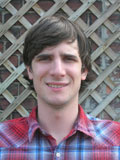 Ian is a PhD candidate in the Graduate Programme in Communication and Culture at York University. His background includes an MSc in Cultural Studies from the University of Edinburgh and a BA in English and Film from the University of Toronto. He joined the Visible City project in 2006, contributing a paper to the fall Working Papers Series on the topic of photoblogging and street photography in Toronto.
Ian is a PhD candidate in the Graduate Programme in Communication and Culture at York University. His background includes an MSc in Cultural Studies from the University of Edinburgh and a BA in English and Film from the University of Toronto. He joined the Visible City project in 2006, contributing a paper to the fall Working Papers Series on the topic of photoblogging and street photography in Toronto.
His MA thesis examined the 1920s European avant-garde ‘city symphony’ films in relation to contemporary thought on the aesthetic form and experience of the modern city. Ian is currently researching the role of film and photography in the struggle over representations of place and the formation and transformation of identities associated with urban spaces.
Jason Rovito
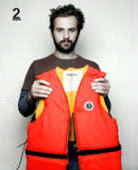 Jason is a Toronto-based critic and a doctoral candidate in the Joint Programme in Communication and Culture at York and Ryerson Universities, which he entered in 2005 after completing his MA in Political Theory at the University of Toronto. He joined the Visible City Project + Archive in the Havana winter of 2007, where he began to cast the task of urban criticism under the light of translation. The resulting project—first presented at the Spring 2007 Visible Working Papers Series as ‘Communicating the City: Beyond Autobiography’—combines Jason’s research interests in experimental epistemology, cultural psychoanalysis, and dialectical topography. In his work as a founding member of LOT: Experiments in Urban Research Jason is pursuing this project further through an investigation of the unconscious of the wireless city.
Jason is a Toronto-based critic and a doctoral candidate in the Joint Programme in Communication and Culture at York and Ryerson Universities, which he entered in 2005 after completing his MA in Political Theory at the University of Toronto. He joined the Visible City Project + Archive in the Havana winter of 2007, where he began to cast the task of urban criticism under the light of translation. The resulting project—first presented at the Spring 2007 Visible Working Papers Series as ‘Communicating the City: Beyond Autobiography’—combines Jason’s research interests in experimental epistemology, cultural psychoanalysis, and dialectical topography. In his work as a founding member of LOT: Experiments in Urban Research Jason is pursuing this project further through an investigation of the unconscious of the wireless city.Sara Udow
Kate Wells
Ms Wells joined the Visible City Project and Archive in May of 2007 as a graduate researcher. Her current research focuses on cultural histories of contested urban spaces, and seeks to challenge and analyze dominant or popular readings of the city through art practice as well as critical theory. Additional projects include an exploration of alternative media, underground communications and resistance movements not only for their political impact but also their resonations in literature and art. Areas and times of research span Renaissance era England, Vietnam War era America, and contemporary Detroit, Michigan.
Ms Wells has recently published “Ancestral Irrepressible: Marshall McLuhan and the Future of the Archive in Derrida’s Archive Fever” in the Flusser Studies journal. She is a teaching assistant in the Humanities Department at York University where she is currently teaching on Medieval and Renaissance literary history.
Past Associates
Stephen Broomer
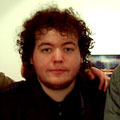 Stephen Broomer is a Toronto-based documentary filmmaker and cultural researcher. His first feature-length film, The Great Homeless Count, has screened at Universities and art galleries throughout Ontario, including York University, the University of Waterloo, and the Niagara Arts Centre. It has also been incorporated into forthcoming lesson plans by faculty at Lethbridge, Simon Fraser, and the University of Washington (Seattle). He is currently developing a documentary project on the gentrification of the Queen West Triangle for the Visible City Research Project and Archive, as well as an independent project on the Village townhouse community at York University. He is currently developing a thesis on the genesis of the English-Canadian Feature Film.
Stephen Broomer is a Toronto-based documentary filmmaker and cultural researcher. His first feature-length film, The Great Homeless Count, has screened at Universities and art galleries throughout Ontario, including York University, the University of Waterloo, and the Niagara Arts Centre. It has also been incorporated into forthcoming lesson plans by faculty at Lethbridge, Simon Fraser, and the University of Washington (Seattle). He is currently developing a documentary project on the gentrification of the Queen West Triangle for the Visible City Research Project and Archive, as well as an independent project on the Village townhouse community at York University. He is currently developing a thesis on the genesis of the English-Canadian Feature Film.
Stephen has worked as a student mentor in York University's Faculty of Fine Arts, and has instructed undergraduate students at the Schulich School of Business in elementary film analysis. He has done cultural programming for the Toronto arts festival Alley Jaunt, and has participated in an administrative capacity in the programming of the York University Department of Film's speaker series. He has written on film and experimental music for a variety of Canadian and International publications.
Spy Dénommé-Welch
Charles Finley, Project Manager
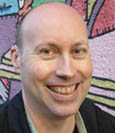 Charles Finley was Project Manager of the Visible City Project + Archive from the project's inception until 2007. Charles holds a Master of Arts in Communication and Culture from York University and did undergraduate work on cities and social theory at Concordia University. His research interests include cities, urban spaces, technology and new media and he has written for Public and WhiteWall Review. Charles has managed technology projects and services for Indigo.ca, for clients in his own firm and as Executive Director of the Knowledge Media Design Institute's Project Open Source | Open Access at the University of Toronto. Charles currently works in the private sector as an Account Planner for interactive services firm Critical Mass Inc. where he is responsible for digital strategy on client accounts such as Citigroup North America.
Charles Finley was Project Manager of the Visible City Project + Archive from the project's inception until 2007. Charles holds a Master of Arts in Communication and Culture from York University and did undergraduate work on cities and social theory at Concordia University. His research interests include cities, urban spaces, technology and new media and he has written for Public and WhiteWall Review. Charles has managed technology projects and services for Indigo.ca, for clients in his own firm and as Executive Director of the Knowledge Media Design Institute's Project Open Source | Open Access at the University of Toronto. Charles currently works in the private sector as an Account Planner for interactive services firm Critical Mass Inc. where he is responsible for digital strategy on client accounts such as Citigroup North America.Jaleen Grove
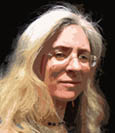 Jaleen Grove contributed to Visible City as a Research Assistant from 2005 to 2006. A Vancouver-based artist, Grove has been participating in artist-run centres and DIY spaces for over ten years. She earned her BFA in studio practice from Emily Carr Institute in 1999, and her eclectic artistic interests have explored everything from traditional painting to relational aesthetics in various media, both in and out of “white cube” spaces. Grove also has a professional practice in graphic design and illustration. She has been the recipient of SSHRC and OGS scholarships, and in 2006 she completed her MA in Communication and Culture at Ryerson University, for which she wrote a thesis on the artworld interventions of the Island Illustrators Society of Victoria, BC. Her research focus continues in the area of the artistic status, social history and cultural contributions of Canadian illustrators.
Jaleen Grove contributed to Visible City as a Research Assistant from 2005 to 2006. A Vancouver-based artist, Grove has been participating in artist-run centres and DIY spaces for over ten years. She earned her BFA in studio practice from Emily Carr Institute in 1999, and her eclectic artistic interests have explored everything from traditional painting to relational aesthetics in various media, both in and out of “white cube” spaces. Grove also has a professional practice in graphic design and illustration. She has been the recipient of SSHRC and OGS scholarships, and in 2006 she completed her MA in Communication and Culture at Ryerson University, for which she wrote a thesis on the artworld interventions of the Island Illustrators Society of Victoria, BC. Her research focus continues in the area of the artistic status, social history and cultural contributions of Canadian illustrators.Dana Iliescu
 Dana Iliescu is currently beginning her final year as an MA candidate in the Joint Program in Communication and Culture, with York and Ryerson universities. She has completed a B.Sc. Honours Specialist in Psychology from the University of Toronto, and is presently integrating her psychology expertise with communication and cultural studies in her research concerning the urban social environment.
Dana Iliescu is currently beginning her final year as an MA candidate in the Joint Program in Communication and Culture, with York and Ryerson universities. She has completed a B.Sc. Honours Specialist in Psychology from the University of Toronto, and is presently integrating her psychology expertise with communication and cultural studies in her research concerning the urban social environment.
Her interests specifically focus on the interaction between individuals' use and perceptions of social public space, and their quality of life. Her involvement with the Visible City project continues since 2006, and has centered around assistance with the editing of archival material.
Sunny Kerr
Raul Moarquech Ferrera-Balanquet
Yvonne Ng
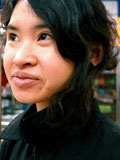 Yvonne Ng served as a graduate researcher with the Visible City Project in 2004. She holds a B.A in Cinema Studies (University of Toronto), and is on a temporary leave from an MA program in Film Studies (York). She currently resides in New York City where she is pursuing an MA in Moving Image Archiving and Preservation (NYU). Her research interests include non-theatrical and orphan films, experimental film culture and institutions, and independent media preservation. Her professional experience includes positions as the Film Print Maintenance Coordinator for the Canadian Filmmakers Distribution Centre, a Managing Editor for the journal Public, and a teaching assistant in film theory at York.
Yvonne Ng served as a graduate researcher with the Visible City Project in 2004. She holds a B.A in Cinema Studies (University of Toronto), and is on a temporary leave from an MA program in Film Studies (York). She currently resides in New York City where she is pursuing an MA in Moving Image Archiving and Preservation (NYU). Her research interests include non-theatrical and orphan films, experimental film culture and institutions, and independent media preservation. Her professional experience includes positions as the Film Print Maintenance Coordinator for the Canadian Filmmakers Distribution Centre, a Managing Editor for the journal Public, and a teaching assistant in film theory at York.
Currently, she works at the New York Public Library's Wilson Processing Project to inventory backlogged collections for the Library for the Performing Arts and with the Media Preservation Unit in the Conservation and Preservation Department of NYU Libraries. She is also working as a research assistant on a book project on Hollis Frampton's Magellan Cycle with Professor Michael Zryd. In addition to her academic and professional work, Ms. Ng serves as the treasurer of the Board for Mammalian Diving Reflex theatre group and is a founding member of the artists' collective, UPBAG. She is also a member of the Association of Moving Image Archivists, through which she received the 2006-7 Technicolor-CFI Sid Solow Scholarship.
Noé Rodríguez
 Role on the project:
Role on the project:Production & archiving team
Degrees Earned:
1997-2001 BA Media Arts, Universidad Europea de Madrid (UEM)
2001-2004 BA in Humanities (Philosophy Stream), UEM
Current Graduate Program and Level:
MFA Film Production in the Graduate Program in Film at York University
Years involved with the Visible City Project: 1 year
Research Interests:
As a filmmaker, he is interested in experimental ethnography and in exploring the everyday coexistence of local communities and their relationship to their landscape through a phenomenological gaze.
Teaching and other Professional Experience:
Eight years working as a freelance in documentaries, fiction films and commercials within the broadcasting standard of production. His production company, Epojé, has contributed eight sixty-minute documentaries about Spanish History for the History Channel (Spain).
Arts Experience:
He has directed and produced several short films. Aadat, a film he co-directed with Xisela Franco, was shot in the Saharaui refugee camps in Tindouf, Algeria. The film has won several international awards and has been screened in numerous festivals worldwide.
James Rowan
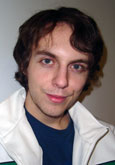 James Rowan joined the project in February of 2007 and upon completing of his Bachelors degree (an Honours BA in Information Technology with a minor in Film Theory) in spring 2007, he hopes to begin a career in the film industry. His interests in film are wide and varying, and are currently focused on the production of action shorts, particularly of the martial arts variety. His role on the project is in the post-production of interviews and other footage that is bound for the website archive.
James Rowan joined the project in February of 2007 and upon completing of his Bachelors degree (an Honours BA in Information Technology with a minor in Film Theory) in spring 2007, he hopes to begin a career in the film industry. His interests in film are wide and varying, and are currently focused on the production of action shorts, particularly of the martial arts variety. His role on the project is in the post-production of interviews and other footage that is bound for the website archive.
